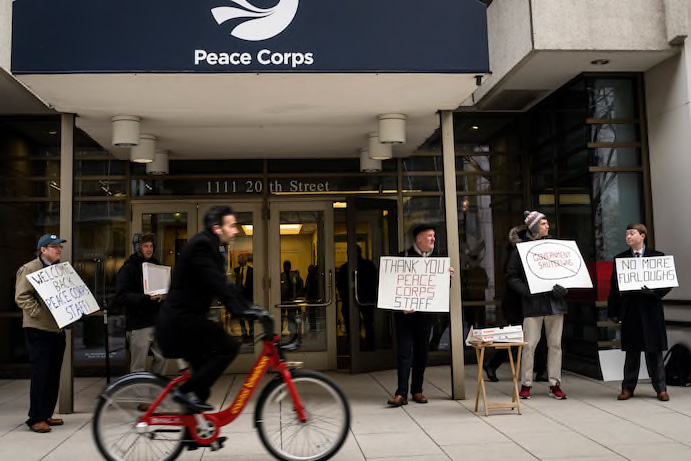Washington Post — “Peace Corps turns 60 amid pandemic, looks to an uncertain future”
Thanks for the ‘heads up’ from Barry Hillenbrand (Ethiopia 1963-65)

Nina Boe (Family photo)
Nina Boe, shown at a wedding, has been living in New York since her work as a Peace Corps volunteer was put on hold and she was ordered to evacuate North Macedonia because of the coronavirus pandemic.
•
by Carol Morello
Washington Post
Oct. 15, 2020
NINA BOE’S LIFE is as much in limbo now as it was the day in March when her work as a Peace Corps volunteer was put on hold and she was ordered to evacuate North Macedonia.
She has been living in New York ever since, interviewing for jobs that have not materialized. She misses her friends in Skopje, North Macedonia’s capital, who became like family, and cries after they call to keep in touch. But she has been advised it could be mid-2021 before she is recalled, and she does not know if she will ever return to North Macedonia as a Peace Corps volunteer.
“I want to see what happens,” she said. “Who knows? Maybe I’ll have a job. Maybe the reality of the pandemic means I won’t.”
Boe’s uncertainty about her future mirrors that of the Peace Corps itself, which traces its origin to a middle-of-the-night speech given by then-Sen. John F. Kennedy at the University of Michigan 60 years ago this week. Over the ensuing decades, it has sent some 250,000 mostly young Americans brimming with idealism to more than 140 countries, with the high-minded mission of promoting world peace and friendship.
Now, for the first time, the Peace Corps does not have a single volunteer in the field. About 7,000 American volunteers and trainees were pulled out of 61 countries in mid-March because of the spreading covid-19 health crisis, and their service contracts have ended. It is not known when any will be allowed to return. Nor is it clear how many of those whose tenure was interrupted will opt to go back into the Peace Corps, or how many have found jobs and moved on with their lives.
The interruption also has prompted a reexamination of how the Peace Corps carries out its mission and a determination to recruit a more diverse group of volunteers.
Jody Olsen, a former Peace Corps volunteer who now is director of the organization, said plans are underway to get “a small presence” back in the field in several countries by January, with the goal of returning to full capacity by the end of 2021. Every country that hosts Peace Corps volunteers has expressed interest in having them return, she said.
About 2,500 evacuated volunteers have answered a survey saying they want to rejoin when the coronavirus pandemic ebbs enough for them to return safely. Olsen said the organization is continuing to recruit, conducting interviews virtually, to prepare for that day. Most of the full-time American staff has already gone back to lay the groundwork.
In thinking through how the Peace Corps will evolve after the pandemic, Olsen said, there will probably be more training in languages and culture, and a greater focus on online education when the volunteers are in-country.
“I believe because of being gone and returning, our partnerships in countries will be stronger,” she said. “They will understand better what we do, and we will understand better what they need.”
One potential change ahead concerns the recruitment of future volunteers. The Peace Corps’ demographics have skewed young, female and White. About two-thirds are White, leading some critics to charge it is not a fair representation of Americans and affects how volunteers view people in the countries where they serve.
“Are we representing the diversity of all Americans, and how can we take that to countries where we serve?” Olsen said. “We want to ensure we are always working on that. All ethnicities, races, rural and urban, ages, first-generation immigrant, and second, third and fourth generations, create the fabric here. We want to be sure we reach out stronger in Native American schools, in historically Black colleges and universities, in historically Hispanic schools, as well as in our bigger universities.”

Members of the National Peace Corps Association and Returned Peace Corps Volunteers of Washington greet furloughed Peace Corps staffers returning to work with donuts and placards of support at the Peace Corps headquarters in Washington in January 2019. (J. Lawler Duggan/For The Washington Post)
The Peace Corps is not without its critics, including some who say the pandemic-induced pause is a time to reassess whether the Peace Corps should even continue to exist.
Chiemeka Njoku and Lindsay Allen helped start Decolonizing Peace Corps after they were evacuated from Africa. They now have 11 core members, all Peace Corps veterans, and more than 4,000 followers on Instagram.
The group argues that the Peace Corps perpetuates a dependency on U.S. assistance and offers fewer benefits for the local community than it does for the many White, affluent volunteers who get the experience of living in another culture.
“At the end of day, someone in the community would have done my job better if they got the same training I did, or had the same income the Peace Corps was giving me,” said Njoku, who was born in Nigeria and was posted to Cameroon as a health-care worker and educator.
During her seven months in Mozambique, Allen said she came to view the Peace Corps as a big government bureaucracy, a tool of American soft power and an institution of U.S. imperialism. While she made many friends there and describes her experience as positive, she questioned whether being a Peace Corps volunteer accomplished anything lasting.
“What good does it do to have an idealistic lens of looking at the Peace Corps?” she said. “We can’t be effective fully if we only look at it from an idealistic view.”
But others say the Peace Corps will be even more relevant when the covid-19 crisis is over.
Sam Farr, a former Peace Corps volunteer in Colombia who went on to spend 20 years as a Democratic congressman from Northern California, considers it a mistake to have withdrawn volunteers worldwide and believes its budget should be increased.
“The Peace Corps is the last mile” in foreign aid, he said. “If you want programs that try to deal with poverty and smarter ways of doing agriculture and delivering health-care services, the Peace Corps can deliver it more effectively than anyone else. If we want to continue the war on poverty in a global format, we have to invest more in the Peace Corps rather than less.”
It remains to be seen how foreign countries that host Peace Corps workers will view U.S. assistance and American volunteers after the spotty U.S. response to the pandemic and changes in U.S. foreign policy, no matter who wins the presidential election.
“I think foreign policy is pretty objectively changing, from whatever you want to call it, American exceptionalism, idealism, and the Peace Corps to some extent will have to reflect that,” said Sarah Heyborne, a former Peace Corps volunteer in the Dominican Republic who launched a Facebook page that raised almost $40,000 to help evacuated volunteers.
“On the other hand, there’s been consistent funding of the Peace Corps through other foreign policy changes. I would never call this a death knell for the Peace Corps,” she
•
Carol Morello is the diplomatic correspondent for The Washington Post, covering the State Department. She previously wrote about demographics and the census. She has worked at The Post since 2000. Before that, she was a reporter for the Philadelphia Inquirer and USA Today.
You and I are old now, I oldest, and still we ride the red school bus, our work incomplete until we are complete. We live and then we die, In-between, we smile and we can be useful. You are one of these”, your medal of honor, not for military valor but for peace pressing on.